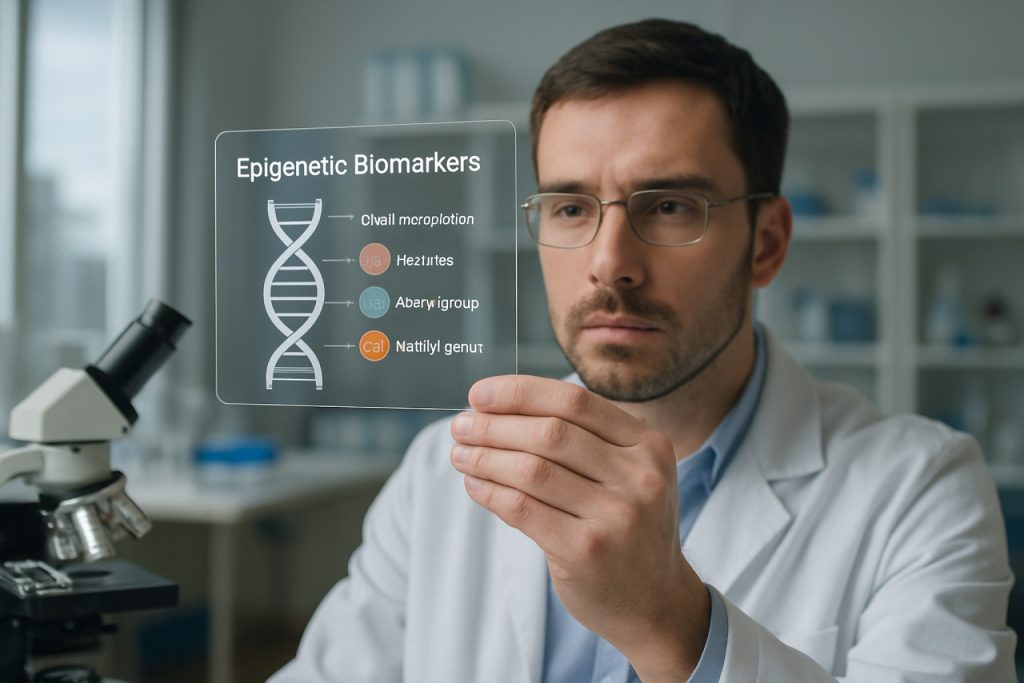
Epigenetic Biomarker Diagnostics in 2025: Unveiling the Next Era of Precision Medicine. Explore Market Acceleration, Technological Innovations, and Strategic Opportunities Shaping the Future.
- Executive Summary: Key Findings and 2025 Outlook
- Market Size, Growth Rate, and Forecasts to 2030
- Technological Innovations in Epigenetic Biomarker Detection
- Competitive Landscape: Leading Companies and New Entrants
- Clinical Applications: Oncology, Neurology, and Beyond
- Regulatory Environment and Standardization Efforts
- Strategic Partnerships, M&A, and Investment Trends
- Challenges: Data Integration, Reproducibility, and Cost
- Emerging Markets and Global Expansion Opportunities
- Future Outlook: Disruptive Trends and Long-Term Projections
- Sources & References
Executive Summary: Key Findings and 2025 Outlook
Epigenetic biomarker diagnostics are rapidly transforming the landscape of precision medicine, offering novel approaches for early disease detection, prognosis, and therapy selection. As of 2025, the field is witnessing accelerated integration of DNA methylation, histone modification, and non-coding RNA signatures into clinical workflows, particularly in oncology, neurology, and prenatal testing. The convergence of high-throughput sequencing, machine learning, and robust bioinformatics pipelines is enabling the identification and validation of clinically actionable epigenetic markers at unprecedented scale and speed.
Key industry players are driving commercialization and regulatory progress. Guardant Health and GRAIL have advanced liquid biopsy platforms that incorporate epigenetic signatures for multi-cancer early detection, with ongoing clinical trials and expanding payer coverage. Illumina continues to supply sequencing technologies and methylation arrays that underpin many diagnostic assays, while Thermo Fisher Scientific and QIAGEN provide sample preparation and analysis solutions tailored for epigenetic applications.
In 2025, the U.S. Food and Drug Administration (FDA) and European Medicines Agency (EMA) are expected to review and potentially approve additional epigenetic-based diagnostic tests, following the precedent set by earlier approvals of methylation-based colorectal and lung cancer screening assays. The clinical adoption of these diagnostics is being propelled by mounting evidence of their superior sensitivity and specificity compared to traditional genetic or protein-based tests, especially for early-stage and minimal residual disease detection.
The next few years will likely see:
- Expansion of epigenetic diagnostics into non-oncology indications, such as neurodegenerative diseases and autoimmune disorders, with several companies initiating pilot studies and partnerships with academic centers.
- Integration of multi-omic data (combining epigenetic, genomic, and proteomic information) to enhance diagnostic accuracy and patient stratification.
- Broader reimbursement and guideline inclusion as real-world evidence accumulates, supporting cost-effectiveness and clinical utility.
- Emergence of decentralized and point-of-care epigenetic testing platforms, leveraging advances in microfluidics and portable sequencing.
Overall, the outlook for epigenetic biomarker diagnostics in 2025 and beyond is highly promising, with sustained investment, regulatory momentum, and technological innovation positioning the sector for significant clinical and commercial impact.
Market Size, Growth Rate, and Forecasts to 2030
The global market for epigenetic biomarker diagnostics is experiencing robust growth, driven by increasing adoption of precision medicine, advances in next-generation sequencing (NGS) technologies, and a rising prevalence of cancer and other chronic diseases. As of 2025, the market is estimated to be valued in the low-to-mid single-digit billions (USD), with projections indicating a compound annual growth rate (CAGR) in the range of 15–20% through 2030. This expansion is underpinned by the growing clinical utility of epigenetic biomarkers—such as DNA methylation, histone modification, and non-coding RNA profiles—in early disease detection, prognosis, and therapy selection.
Key industry players are investing heavily in the development and commercialization of epigenetic diagnostic assays. Illumina, Inc., a global leader in sequencing and array-based solutions, continues to expand its portfolio of NGS platforms and methylation arrays, which are widely used in both research and clinical diagnostics. QIAGEN N.V. offers a range of sample preparation and assay technologies for epigenetic analysis, supporting both laboratory-developed tests and in vitro diagnostic (IVD) applications. F. Hoffmann-La Roche Ltd is also active in this space, leveraging its expertise in molecular diagnostics to develop and market epigenetic-based cancer screening and monitoring solutions.
The oncology segment remains the largest and fastest-growing application area, with liquid biopsy tests utilizing epigenetic biomarkers gaining regulatory traction and clinical adoption. For example, Guardant Health, Inc. and GRAIL, LLC are advancing blood-based multi-cancer early detection tests that incorporate DNA methylation signatures, aiming to transform cancer screening paradigms. These innovations are expected to drive significant market expansion as reimbursement pathways and clinical guidelines evolve to support broader use.
Geographically, North America and Europe currently dominate the market, owing to established healthcare infrastructure, high R&D investment, and favorable regulatory environments. However, Asia-Pacific is anticipated to witness the fastest growth through 2030, propelled by increasing healthcare expenditure, expanding genomics initiatives, and rising awareness of personalized medicine.
Looking ahead, the epigenetic biomarker diagnostics market is poised for continued acceleration, fueled by ongoing technological advancements, expanding clinical evidence, and the integration of multi-omics approaches. Strategic collaborations between diagnostic companies, pharmaceutical firms, and academic institutions are expected to further catalyze innovation and market penetration over the next five years.
Technological Innovations in Epigenetic Biomarker Detection
The field of epigenetic biomarker diagnostics is experiencing rapid technological innovation, particularly as the demand for precision medicine and early disease detection intensifies in 2025. Epigenetic biomarkers—such as DNA methylation patterns, histone modifications, and non-coding RNA profiles—are increasingly recognized for their potential to provide sensitive and specific diagnostic information, especially in oncology, neurology, and rare diseases.
One of the most significant advancements is the integration of next-generation sequencing (NGS) with targeted methylation analysis. Companies like Illumina, Inc. have developed high-throughput sequencing platforms that enable comprehensive methylome profiling from minimal sample input, supporting both research and clinical applications. These platforms are being adapted for liquid biopsy approaches, allowing for non-invasive detection of cancer-specific methylation signatures in circulating cell-free DNA (cfDNA).
Another notable innovation is the development of digital PCR (dPCR) and droplet digital PCR (ddPCR) technologies, which offer ultra-sensitive quantification of epigenetic modifications. Bio-Rad Laboratories, Inc. is a leader in this space, providing ddPCR systems that can detect rare methylation events with high precision, making them suitable for early cancer detection and monitoring minimal residual disease.
Artificial intelligence (AI) and machine learning are also being harnessed to interpret complex epigenetic datasets. Thermo Fisher Scientific Inc. and other major diagnostics companies are investing in bioinformatics solutions that can integrate multi-omics data, including epigenetic, genomic, and transcriptomic information, to improve diagnostic accuracy and predictive power.
In 2025, regulatory progress is evident as well. The U.S. Food and Drug Administration (FDA) has begun to clear and approve more epigenetic-based diagnostic assays, reflecting growing confidence in their clinical utility. For example, Guardant Health, Inc. and Epigenomics AG are advancing blood-based methylation tests for early cancer detection, with some products already achieving regulatory milestones in the U.S. and Europe.
Looking ahead, the next few years are expected to bring further miniaturization and automation of epigenetic assays, enabling point-of-care testing and broader accessibility. The convergence of NGS, digital PCR, and AI-driven analytics is poised to transform epigenetic biomarker diagnostics from specialized laboratory tests to routine clinical tools, supporting earlier intervention and more personalized treatment strategies.
Competitive Landscape: Leading Companies and New Entrants
The competitive landscape for epigenetic biomarker diagnostics in 2025 is characterized by a dynamic mix of established molecular diagnostics companies, specialized epigenetics firms, and innovative new entrants. The sector is driven by increasing clinical adoption of non-invasive tests, advances in next-generation sequencing (NGS), and growing demand for early cancer detection and precision medicine.
Among the global leaders, Illumina, Inc. continues to play a pivotal role, leveraging its dominance in NGS platforms and expanding its portfolio to include methylation sequencing and epigenomic profiling solutions. Illumina’s technology underpins many commercial and research-based epigenetic assays, and the company has formed strategic collaborations with diagnostic developers to accelerate clinical translation.
Another major player, F. Hoffmann-La Roche Ltd, through its diagnostics division, is actively developing and marketing epigenetic-based assays, particularly for oncology. Roche’s acquisition of Foundation Medicine and investments in liquid biopsy technologies have positioned it at the forefront of integrating epigenetic biomarkers into comprehensive cancer diagnostics.
Specialized companies such as Guardant Health, Inc. and GRAIL, LLC are advancing blood-based multi-cancer early detection tests that incorporate DNA methylation signatures. GRAIL’s Galleri test, for example, utilizes methylation patterns to detect over 50 cancer types from a single blood draw, and is being adopted in clinical settings in the US and internationally.
In Europe, Epigenomics AG remains a key innovator, with its Epi proColon test for colorectal cancer screening based on methylated Septin9 DNA. The company is expanding its pipeline to include additional cancer types and is seeking regulatory approvals in new markets.
Emerging entrants are also shaping the landscape. Twist Bioscience Corporation is providing synthetic DNA tools and custom methylation panels, enabling both research and clinical labs to develop novel epigenetic assays. Meanwhile, Oxford Nanopore Technologies plc is gaining traction with real-time, long-read sequencing platforms capable of direct methylation detection, opening new possibilities for rapid and comprehensive epigenetic profiling.
Looking ahead, the competitive environment is expected to intensify as more companies enter the market, regulatory pathways for epigenetic diagnostics become clearer, and reimbursement frameworks evolve. Strategic partnerships, technology integration, and clinical validation will be critical for both established players and new entrants to capture market share in this rapidly advancing field.
Clinical Applications: Oncology, Neurology, and Beyond
Epigenetic biomarker diagnostics are rapidly transforming clinical practice across oncology, neurology, and additional medical fields. In 2025, the integration of DNA methylation, histone modification, and non-coding RNA signatures into diagnostic workflows is accelerating, driven by advances in high-throughput sequencing and bioinformatics. These biomarkers offer the potential for earlier detection, improved prognostication, and personalized treatment strategies.
In oncology, epigenetic diagnostics are now central to liquid biopsy platforms, enabling non-invasive cancer detection and monitoring. For example, Guardant Health and GRAIL have developed blood-based assays that analyze methylation patterns to identify multiple cancer types at early stages. These tests are being adopted in clinical settings for screening and minimal residual disease monitoring, with ongoing large-scale validation studies expected to further expand their clinical utility through 2025 and beyond. Similarly, Epigenomics AG continues to advance its Epi proColon test, which detects colorectal cancer-specific methylation markers in plasma, and is working on expanding its portfolio to other cancer types.
In neurology, epigenetic biomarkers are emerging as promising tools for the early diagnosis and stratification of neurodegenerative diseases. Companies such as Thermo Fisher Scientific and Illumina are providing platforms and reagents for the detection of methylation changes associated with Alzheimer’s disease and other neurological disorders. These technologies are being evaluated in clinical research settings, with the goal of developing minimally invasive tests that can distinguish between different forms of dementia and predict disease progression. The next few years are expected to see the first regulatory submissions for such assays, particularly as large biobanks and longitudinal studies yield robust validation data.
Beyond oncology and neurology, epigenetic diagnostics are being explored in fields such as cardiology, autoimmune disease, and infectious disease. For instance, QIAGEN is developing epigenetic panels for cardiovascular risk assessment and transplant rejection monitoring. The company’s sample-to-insight workflow enables the integration of epigenetic data into routine clinical decision-making, a trend likely to accelerate as reimbursement pathways and clinical guidelines evolve.
Looking ahead, the clinical adoption of epigenetic biomarker diagnostics is poised for significant growth. Key drivers include the increasing availability of multi-omic datasets, improvements in assay sensitivity and specificity, and the expansion of regulatory approvals. As more companies enter the space and collaborative efforts between industry and academia intensify, the next few years will likely see epigenetic diagnostics become a mainstay in precision medicine across a widening array of diseases.
Regulatory Environment and Standardization Efforts
The regulatory environment for epigenetic biomarker diagnostics is rapidly evolving as these technologies transition from research to clinical application. In 2025, regulatory agencies such as the U.S. Food and Drug Administration (FDA) and the European Medicines Agency (EMA) are intensifying their focus on the analytical and clinical validation of epigenetic assays, particularly those intended for early cancer detection, prognosis, and therapy selection. The FDA has issued guidance on the development and validation of in vitro diagnostic (IVD) devices, emphasizing the need for robust evidence of clinical utility and reproducibility for epigenetic-based tests. This is particularly relevant as companies seek premarket approval or clearance for liquid biopsy platforms and methylation-based assays.
Standardization efforts are being spearheaded by international consortia and industry groups. The International Organization for Standardization (ISO) continues to develop and update standards for molecular diagnostics, including those relevant to epigenetic markers, such as ISO 15189 for medical laboratories and ISO 20387 for biobanking. These standards are critical for ensuring the comparability and reliability of results across laboratories and geographies. In parallel, the Clinical and Laboratory Standards Institute (CLSI) is working on best practice guidelines for the validation and quality control of next-generation sequencing (NGS) and methylation-specific assays, which are central to many epigenetic diagnostic platforms.
Several leading companies are actively engaging with regulators and standards bodies to shape the landscape. Guardant Health and GRAIL are notable for their development of blood-based multi-cancer early detection tests that incorporate epigenetic signatures, and both have ongoing discussions with the FDA regarding regulatory pathways. Illumina, a major supplier of sequencing technology, is collaborating with regulatory agencies to ensure that its platforms meet evolving requirements for clinical-grade epigenetic testing. Additionally, QIAGEN is involved in standardization initiatives, providing sample preparation and assay solutions that comply with international quality standards.
Looking ahead, the next few years are expected to bring greater harmonization of regulatory requirements across major markets, driven by the increasing adoption of epigenetic diagnostics in oncology and other fields. The establishment of reference materials, proficiency testing schemes, and data-sharing frameworks will be crucial for building trust in these technologies. As regulatory clarity improves, more epigenetic biomarker assays are anticipated to achieve formal approval, accelerating their integration into routine clinical practice and expanding patient access to precision diagnostics.
Strategic Partnerships, M&A, and Investment Trends
The epigenetic biomarker diagnostics sector is experiencing a surge in strategic partnerships, mergers and acquisitions (M&A), and targeted investments as the field matures and clinical adoption accelerates. In 2025, the competitive landscape is shaped by collaborations between established diagnostics companies, emerging biotech firms, and major pharmaceutical players, all seeking to leverage advances in DNA methylation, histone modification, and non-coding RNA profiling for early disease detection and precision medicine.
One of the most prominent players, Illumina, Inc., continues to expand its reach in epigenetic diagnostics through both organic growth and strategic alliances. Illumina’s sequencing platforms are foundational for many epigenetic assays, and the company has entered into multiple partnerships with biotech firms developing proprietary biomarker panels for oncology and neurodegenerative diseases. These collaborations are designed to integrate Illumina’s high-throughput sequencing with novel bioinformatics pipelines, accelerating the translation of research findings into clinical-grade diagnostics.
Another key player, Guardant Health, Inc., is actively investing in the development and commercialization of liquid biopsy tests that incorporate epigenetic signatures. In 2024 and 2025, Guardant Health has announced several joint ventures with academic medical centers and smaller biotech companies to co-develop methylation-based assays for early cancer detection. These partnerships are often structured to combine Guardant’s expertise in cfDNA analysis with innovative epigenetic biomarker discovery platforms.
M&A activity is also robust. Thermo Fisher Scientific Inc. has made strategic acquisitions of smaller firms specializing in epigenetic assay development and data analytics, aiming to offer end-to-end solutions for clinical laboratories. These moves are intended to strengthen Thermo Fisher’s position in the rapidly growing market for multi-omics diagnostics, where epigenetic data is increasingly integrated with genomic and proteomic information.
Investment trends in 2025 show a marked increase in venture capital and corporate funding directed at startups focused on single-cell epigenomics and AI-driven biomarker discovery. Companies such as Bio-Rad Laboratories, Inc. are entering into co-development agreements with AI firms to enhance the sensitivity and specificity of epigenetic tests, particularly for early-stage cancers and rare diseases.
Looking ahead, the next few years are expected to see further consolidation as larger diagnostics and life sciences companies seek to acquire innovative startups with validated epigenetic biomarker platforms. Strategic partnerships will likely focus on expanding test menus, improving regulatory pathways, and scaling manufacturing capabilities to meet anticipated clinical demand. The sector’s dynamism is underpinned by the growing recognition of epigenetic biomarkers as critical tools for non-invasive, personalized diagnostics across oncology, neurology, and beyond.
Challenges: Data Integration, Reproducibility, and Cost
Epigenetic biomarker diagnostics, while promising for early disease detection and personalized medicine, face significant challenges in data integration, reproducibility, and cost as the field advances into 2025 and beyond. The complexity of epigenetic data—encompassing DNA methylation, histone modifications, and non-coding RNA profiles—demands robust computational infrastructure and standardized protocols for meaningful clinical application.
Data integration remains a primary hurdle. Epigenetic datasets are often generated using diverse platforms and methodologies, leading to heterogeneity in data formats and quality. Harmonizing these datasets for cross-study analysis is non-trivial, especially as multi-omics approaches become more prevalent. Companies such as Illumina and Thermo Fisher Scientific have developed high-throughput sequencing and array-based technologies for epigenetic profiling, but interoperability between platforms and the integration of epigenetic data with genomic, transcriptomic, and clinical information remain ongoing challenges. Efforts to standardize data formats and analysis pipelines are underway, with industry consortia and organizations like Global Alliance for Genomics and Health (GA4GH) working to establish best practices for data sharing and integration.
Reproducibility is another critical concern. Variability in sample processing, assay sensitivity, and bioinformatic analysis can lead to inconsistent results across laboratories and studies. This issue is particularly acute for epigenetic biomarkers, which are sensitive to environmental factors and sample handling. Companies such as QIAGEN and Roche are addressing these challenges by developing standardized kits and protocols for epigenetic assays, aiming to reduce technical variability and improve reproducibility. Nonetheless, the field continues to grapple with the need for large, well-annotated reference datasets and external quality assessment schemes to benchmark assay performance.
Cost remains a significant barrier to widespread adoption of epigenetic diagnostics. While sequencing costs have declined, comprehensive epigenetic profiling—especially at single-cell resolution—remains expensive and resource-intensive. This limits accessibility in routine clinical settings and in low-resource environments. Companies like Illumina are working to reduce costs through automation and scalable platforms, but further innovation is needed to make these technologies broadly affordable.
Looking ahead, overcoming these challenges will require coordinated efforts between technology developers, clinical laboratories, and regulatory bodies. Advances in artificial intelligence for data harmonization, the establishment of universal standards, and continued reductions in assay costs are expected to drive progress. As these barriers are addressed, the clinical utility and adoption of epigenetic biomarker diagnostics are likely to expand significantly in the coming years.
Emerging Markets and Global Expansion Opportunities
The global landscape for epigenetic biomarker diagnostics is rapidly evolving, with emerging markets presenting significant expansion opportunities for industry stakeholders in 2025 and the coming years. As the demand for precision medicine and early disease detection grows, countries in Asia-Pacific, Latin America, and the Middle East are increasingly investing in advanced molecular diagnostics, including epigenetic assays.
In Asia-Pacific, China and India are at the forefront of this expansion. China’s government has prioritized genomics and precision health in its national strategies, fostering a robust environment for local and international companies to introduce epigenetic diagnostic platforms. Companies such as BGI Genomics are actively developing and commercializing DNA methylation-based tests for oncology and prenatal screening, leveraging the country’s large population and growing healthcare infrastructure. India, with its rapidly expanding biotechnology sector, is witnessing increased collaborations between domestic firms and global leaders to bring affordable epigenetic testing to market.
Latin America is also emerging as a promising region, driven by rising cancer incidence and government initiatives to improve diagnostic capabilities. Brazil and Mexico, in particular, are seeing investments in laboratory infrastructure and training, enabling the adoption of advanced epigenetic assays. Companies like Illumina and Thermo Fisher Scientific are expanding their distribution networks and partnering with local laboratories to facilitate access to their next-generation sequencing and methylation analysis platforms.
In the Middle East, the United Arab Emirates and Saudi Arabia are leading efforts to modernize healthcare systems and integrate precision diagnostics. National genomics initiatives and partnerships with international technology providers are accelerating the introduction of epigenetic biomarker tests for oncology and rare diseases. Roche, a global leader in molecular diagnostics, is actively expanding its presence in these regions, offering a portfolio of epigenetic and genomic testing solutions.
Looking ahead, the outlook for epigenetic biomarker diagnostics in emerging markets is highly favorable. Key drivers include increasing healthcare expenditure, supportive regulatory reforms, and a growing emphasis on early disease detection. However, challenges such as limited reimbursement frameworks and the need for specialized technical expertise remain. Industry leaders are addressing these barriers through education, local partnerships, and the development of cost-effective, scalable diagnostic platforms tailored to regional needs. As a result, the next few years are expected to witness accelerated adoption and market growth, positioning emerging economies as vital contributors to the global epigenetic diagnostics sector.
Future Outlook: Disruptive Trends and Long-Term Projections
The landscape of epigenetic biomarker diagnostics is poised for significant transformation in 2025 and the coming years, driven by rapid technological advances, regulatory momentum, and expanding clinical applications. Epigenetic biomarkers—such as DNA methylation patterns, histone modifications, and non-coding RNA profiles—are increasingly recognized for their potential to enable earlier, more precise disease detection and monitoring, particularly in oncology, neurology, and rare diseases.
A major disruptive trend is the integration of next-generation sequencing (NGS) and digital PCR platforms into routine diagnostics. Companies like Illumina and Thermo Fisher Scientific are at the forefront, offering high-throughput, cost-effective solutions for epigenetic analysis. These platforms are enabling the development of multi-analyte liquid biopsy tests that combine genetic and epigenetic markers, improving sensitivity and specificity for early cancer detection. For example, Guardant Health and GRAIL are advancing blood-based assays that incorporate methylation signatures to detect multiple cancer types at early stages.
Regulatory progress is also accelerating. The U.S. Food and Drug Administration (FDA) and European Medicines Agency (EMA) are increasingly engaging with developers of epigenetic diagnostics, with several tests receiving breakthrough device designations or CE marking. This regulatory support is expected to catalyze further investment and clinical adoption, particularly as payers begin to recognize the value of early, non-invasive diagnostics in reducing long-term healthcare costs.
Artificial intelligence (AI) and machine learning are set to play a pivotal role in the interpretation of complex epigenetic data. Companies such as Illumina and Thermo Fisher Scientific are investing in bioinformatics platforms that leverage AI to identify clinically actionable patterns from large-scale epigenomic datasets. This is expected to accelerate biomarker discovery and enable more personalized diagnostic and prognostic tools.
Looking ahead, the next few years will likely see the expansion of epigenetic diagnostics beyond oncology into areas such as neurodegenerative diseases, autoimmune disorders, and prenatal screening. Strategic collaborations between diagnostic companies, pharmaceutical firms, and academic institutions are anticipated to drive innovation and validation of new biomarkers. As costs continue to decline and clinical utility is demonstrated in large-scale studies, epigenetic biomarker diagnostics are positioned to become a cornerstone of precision medicine by the end of the decade.
Sources & References
- Guardant Health
- Illumina
- Thermo Fisher Scientific
- QIAGEN
- F. Hoffmann-La Roche Ltd
- Epigenomics AG
- Twist Bioscience Corporation
- EMA
- International Organization for Standardization
- Clinical and Laboratory Standards Institute
- Global Alliance for Genomics and Health
- BGI Genomics



